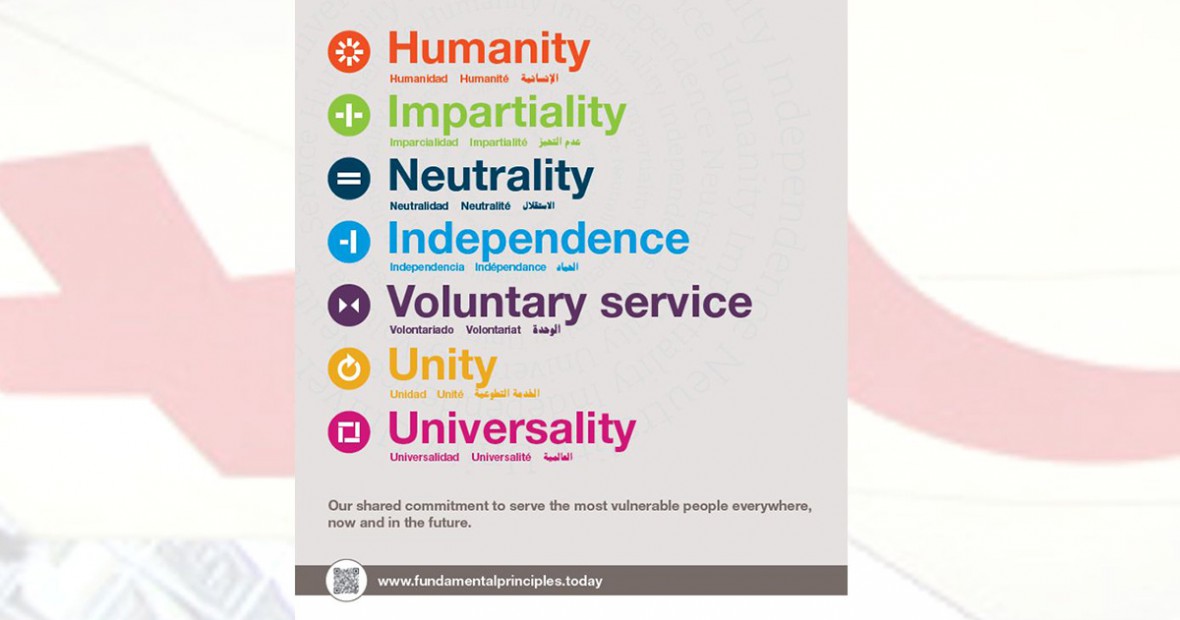Joint Statement by
Peter Maurer, President of the International Committee of the Red Cross and Tadateru Konoé, President of the International Federation of Red Cross and Red Crescent Societies
Neutral and impartial humanitarian action, delivered by volunteers, has been at the heart of the International Red Cross and Red Crescent Movement’s work since our very beginnings. Formally adopted 50 years ago, the Fundamental Principles – Humanity, Impartiality, Neutrality, Independence, Voluntary Service, Unity and Universality – serve as the basis of our decisions and actions now and in the future. Seeing our dedicated volunteers and staff in action to help those struggling to overcome the aftermath of Nepal’s violent earthquake, one can have no doubt that they are still central to the humanitarian role and values which we celebrate today. Nonetheless, as humanitarian needs escalate and grow more demanding, the relevance of our principles and our ability to deliver services is being challenged.
Since the adoption of the Fundamental Principles, the nature of crisis and war has grown more complex. Conflicts are now protracted and natural disasters are more extreme, aggravated by climate change. Increased migration flows, recurrent food security crises and health epidemics have left populations on the edge, creating resentment and fueling distrust.
In Syria, Yemen, Central African Republic, Myanmar and South Sudan, dozens of Red Cross and Red Crescent volunteers have been killed or injured in the past 12 months. Aid workers battling Ebola in Guinea have been subjected to an average of 10 attacks every month. Health facilities in Syria and Yemen are being directly targeted and aid convoys are coming under threat, despite being clearly marked with the red cross or red crescent protective emblems.
This lack of understanding, common misinterpretations, or the increasingly frequent politicization and sometimes blatant rejection of the Fundamental Principles, is jeopardizing our ability to access and respond to the needs of people in some of the most dangerous situations on earth. We must redouble our efforts to make clear to the world what we in the Red Cross Red Crescent Movement stand for and we must carry out our tasks with resolve and determination to meet the needs of vulnerable communities affected by crisis or conflict.
In today’s humanitarian landscape, we cannot afford for our Fundamental Principles to be misunderstood. Guided by humanity, the Red Cross Red Crescent’s sole purpose is to help people in need. Our actions are governed by impartiality – services are delivered regardless of people’s nationality, origin, opinions or beliefs. Our neutrality ensures that all parties understand we do not take sides.
Yet, in this changing humanitarian landscape, those who provide assistance, specifically our community-based volunteers, face unimaginable personal risk. These principles are our only means of ensuring the 17 million Red Cross and Red Crescent volunteers present in 189 countries worldwide are able to deliver aid to people affected by conflict and crisis. In one form or another, they have underpinned principled humanitarian action for more than 150 years, ensuring that, when people are at their most desperate, they have access to protection and support. We can only do our work if our principles and our emblem are respected: ultimately, they are our only shield.
So now, more than ever, we urge all state and non-state parties to uphold the shared humanitarian values enshrined in the Red Cross Red Crescent’s principles. This is necessary to build the trust and acceptance of communities and continue to deliver life-saving support to the most vulnerable. The commitment of our millions of volunteers to their work is in itself an affirmation of the belief that this can and will happen.
In celebration of a half a century since their adoption, the International Red Cross and Red Crescent Movement is launching a global dialogue on the Fundamental Principles and their continued role in the delivery of humanitarian services. To learn more, visit: www.fundamentalprinciples.today.
Follow Live Tweets @ICRC_nd


